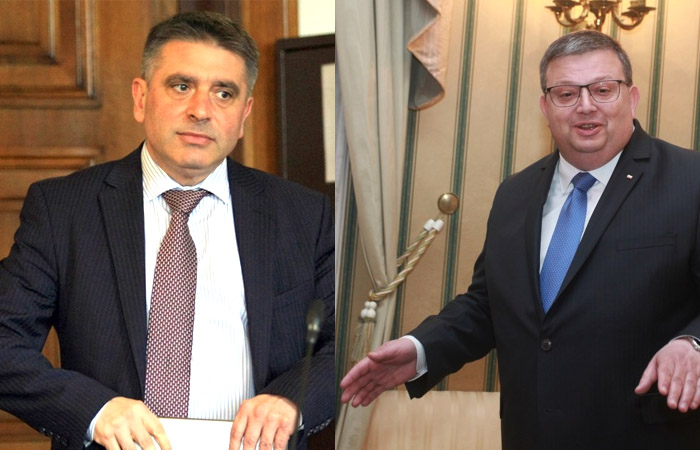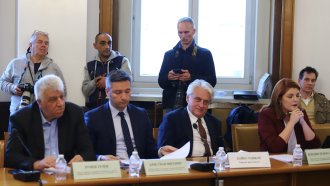Commentaries:
Anticorruption Commission discovers no conflict of interest in ApartmentGate scandal

The Anticorruption Commission, which was conducting a several-month long inquiry into the ApartmentGate scandal did not find any conflict of interest in it. The Prosecutor General “reassured” the public, that this is only one inquiry, tax fraud and other probes are also underway. Which is hardly reassuring, as there is no real issue with the legality of the deals. Instead, the problem is precisely conflict of interest, abuse of public office and bribe. Allegedly.
The Anticorruption Commission is so fully aware of this that they bent over backwards in their report to argue the obvious conflict of interest is in fact not conflict of interest that they based their argument on an event that never occurred. The mistake is brilliant in demonstrating both the incompetence of the body, which is supposed to fight high level corruption, and its actual purpose: to protect “our people” and target the rest.
The ApartmentGate scandal broke earlier this year when Svobodna Evropa (Free Europe) reported that several high-ranking GERB officials had bought luxurious apartments from an infamous real estate developer, Artex, for a fourth of the market price. The most prominent figures in the mix were the then-second most powerful person in GERB, Tsvetan Tsvetanov and then-Justice Minister Tsetska Tsacheva.
Coincidently, just after these high ranking GERB operatives struck these incredible deals, GERB introduced some very favorable, as far as Artex is concerned, bill of amendments. Artex at the time had to renew a permit for one of its most ambitious projects, a 30+ story building in one of the most expensive areas in Sofia. The procedure is lengthy and expensive. The amendments expand the time such permits are valid, and although Artex still had to renew the permit, as it was still fell under the previous rules, key officials in Sofia municipality issued directions that Artex’s case falls under the new rules.
Tsetska Tsvacheva resigned almost immediately. Tsvetanov resigned one of his three posts. Both maintained that there was nothing illegal nor wrong in the deals. Tsvetanov gave an interview, in which he declared that “there is no one who can punish him”. And right he was. Although Boyko Borissov eventually made him resign all his posts, it is clear that none of the apartment recipients will receive any punishment, neither will the public get an acknowledgement that any wrongdoing has occurred.
Over the past months employees at the Anticorruption Commission have been hard at work to justify ApartmentGate but it doesn’t seem they’ve actually investigated. Instead, they knew what was the case (GERB officials got cheap deals for apartments in exchange for legislation) but needed to present it as something else. How we know? Svobodna Evropa discovered that while the commission’s report went to a lot of detail and length in explaining why Tsacheva voting in favor for such a bill is not in fact conflict of interest, the authors failed to check whether Tsacheva actually voted for it. They just assumed she did, and – ironically – with good reason. But in fact, Tsacheva was not in Parliament at all when the bill was voted on. How MPs vote in Parliament is a matter of public record, mind you.
It is poetic indeed, be it not entirely justice. But still, even the commission itself, which was apparently tasked with proving there was no conflict of interest, operated on the assumption there was indisputable and direct evidence to that effect on record.
The fact that Tsacheva was not there for the vote does not exempt her from responsibility. Or at least, it shouldn’t. But assuming that she voted for the bill while she wasn’t even there is itself eligible to be included in a hypothetical body of evidence against in a hypothetical case for conflict of interest. Which will remain as hypothetical as can be.
Justice Minister Danail Kirilov continues exchange with the Council of Europe on reforms

Bulgaria has been looking the other way for a decade now regarding the Prosecutor General’s untouchable status in the justice system. The position is arguably the most powerful and unaccountable in the whole of the public sphere. One Bulgarian Prosecutor General from the past famously said “Above me is only God”. This is not much of an overstatement.
Since Bulgaria joined the EU, it’s been subject to the Cooperation and Verification Mechanism along with Romania. The mechanism has not done much in helping to achieve actual reform in the Bulgarian justice system but its reports have been clear of the weaknesses and what needs to be done to make the system such so the country become one of rule of law. One of the first recommendations, repeated over and over through the years, and given significant priority is precisely the role of the Prosecutor General. He is untouchable, answers to no one, and has total and immediate power over all prosecutors, as they are his direct subordinates.
Enter recently appointed minister of justice, Danail Kirilov. He is not famous for his competence and often puts smiles on journalists’ faces when he is caught unaware of important events or policies. But he is also loyal to PM Boyko Borissov to a point of embarrassment: he was actually caught on camera kissing Borissov’s hand at his appointment as justice minister. But this is just the sort of person one would use to lie bluntly against clear facts and insist on a ridiculous notion without skipping a beat
Kirilov is currently on a just as embarrassing streak. Over the past two weeks he has been claiming the government is fulfilling the Council of Europe’s recommendations regarding the Prosecutor General but also actively lying about what they are, even at the methodical and unequivocal explanations to the contrary by the CE.
The reforms in question introduce procedures to ensure there could be an independent investigations and indictments of the sitting so-called Big Three: The Prosecutor General and two heads of the supreme courts: of the Administrative Supreme Court and the Supreme Court of Cassations.
Except, there has never been an issue with the supreme judges on this in general, and definitely nothing from the CE regarding the two heads of the courts. The recommendations are clear in pointing specifically to the Prosecutor General only. And this is only natural, as there are substantial differences between the scope and kind of power in the case of the Prosecutor General on the one hand, and the judges on the other.
Regardless the minister maintained that the reason for the new rules to target all three position at the top of the justice system, instead of just the Prosecutor General, is because of the CE’s recommendations.
The EC has since written two official statements: in the first was a letter to the media and clearly states that the CE has never recommended new procedures regarding the judges and that the concerns have always been about how the unique position of the Prosecutor General does not permit an independent investigation into him. This is not true for the supreme judges. “expanding the scope [of the bill] to include the two heads of the supreme courts is an initiative of the Bulgarian authorities and was never asked of the court in Strasburg.”, the first letter reads. When asked about it, Kirilov said he is not aware of the letter.
The second was a position, published on the CE’s website and it raises concerns that the provisions in the new bill does not in fact provide for effective ways to ensure an independent investigation in to the Prosecutor General:
“While welcoming the authorities’ readiness to work on a legislative proposal, they noted that the draft bill of 14 June 2019 does not address the risks for the independence and the effectiveness of an investigation against a [Prosecutor General] at the pre-trial stage and could indeed make investigation more difficult to initiate.”
So not only was Kirilov bluntly lying about the CE requesting measures for the heads of the courts, but the proposed measures actually do not introduce a real change regarding the main issue with the Prosecutor General. Moreover, a number of Bulgarian NGOs criticized the bill heavily, saying it actually opens the door for judges to be pressured.
This is as far as the reform into the justice system will go. The Prosecutor General will remain untouchable, so much is clear. The bill is nothing more than a stunt, which will fuel a series of coverage from the government-friendly press in the country, saying that this government has reformed the justice system. And as this “reform” will likely be followed by the discontinuation of the Cooperation and Verification Mechanism, this government will more than likely claim credit for that as well. Although, it became abundantly clear in the last report that the CE is plainly given up on pushing Bulgiria to reform the justice system, and has likely decided to shut down the CVM.
GERB manages to have its cake and eat it too with new plan for Sofia car restrictions

GERB introduced a plan for significant car restrictions in Sofia over the past week, but was also quick to declare that the plan is merely a framework, mapping out GERB’s general ideas as to where the city planning is headed.
Actually, the plan includes some reasonable measures, which aim to restrict the cars in the city center including expanding the paid parking zones and increasing the parking rates for the zones in the heart of the city center. The municipal administration plans on building additional 300 km of bike lanes in Sofia, increase taxes on diesel cars, and implement measures to make public transportation faster and more efficient. The whole plan has a timeframe spanning to 2035.
Expanding the paid parking zones and increasing the rates is the most immediate measure, which does not need too much time nor effort to implement. But GERB was quick to put out a disclaimer to the public that the plan in general deals with 2035, and really, the document is merely a “philosophy”, underlining the general direction the local government is looking at. There will be no expansion of the paid parking zones in Sofia, nor an increase in the rates in the foreseeable future. One GERB official spoke of these measures to the press, calling them no more than recommendations. Which is curious given the city is governed by GERB, this is an elaborate plan, which the municipal government proposed, and which the city council passed through vote. But somehow, a nonbinding recommendation. To whom?
GERB is obviously quite worried that further restrictions in the parking regulations in the city center will not do them good in the upcoming local elections, which are scheduled for the fall. At the same time, the municipal government has developed and put this plan through the necessary procedure to legitimize it and make it implementation-ready. In other words, GERB is trying to satisfy two contradicting voter groups at once: those who see the city as over polluted and overpopulated by cars, and those who are in said cars and do not wish to leave them.
In other news:
GERB returned overpaid subsidies, BSP spent them all

GERB returned the overpaid state subsidies this week, just after the bill requiring the parties to do so was signed into law. GERB had more than 5,6 million leva of overpaid subsidies for this year. The Bulgarian Socialist Party got 4 million leva more than it should have, but BSP will not be able to return them, as it’s spent them all. The sum will be reimbursed by lowering future installments. The full number of subsidies, which all the parties must restore is 14.5 million leva.
Ex show host Slavi Trifonov announced earlier this year that the parties have been receiving 13 leva per vote instead of the 11 leva they should, according to the law. The mistake came from a flaw in the methodology, which count the final votes a party or coalition had received.
Bulgarian authorities have known for 10 years of people with illegal citizenship and are finally going to take it away

Bulgarian authorities have known for a decade that four persons – three Russians and a Kazakhstani – have had Bulgarian citizenship illegally. State institutions conducted investigations into falsified documents, which were submitted to obtain citizenship, as early as 2009. The State Agency for National Security (DANS), which is the body in charge with checking this type of documentation when granting citizenship could not have been unaware of these investigations.
It was not till this Friday that the Prosecutor’s Office finally announced that the state will take away the citizenship of the four persons, who got it illegally. In two of the cases the body of evidence includes a whole range of false documents, including fake seals of former ministers and various other documents. In another, the person who DANS approved to receive Bulgarian citizenship was at the time under investigation for money laundering by Interpol. According to Bulgarian law, this alone is grounds for rejecting the application, and DANS should have known about the investigation but either failed to check or turned a blind eye.
Although the Bulgarian authorities have been fully aware of these violations, they have not acted on them and the four persons in question have been EU citizens illegally for a decade.
Half of Bulgarians not convinced democracy is the best form of governance

76% of respondents across the globe believe that democracy has its imperfections but is still the best form of governance. Bulgarians also predominantly support this notion but not nearly as much: only 52% of Bulgarians share this belief.
Gallup International conducted the poll across 60 countries, interviewing 60’000 people twice: once in 2005 and once in 2015. The two polls mark a trend of declining trust in democracy in Bulgaria and the region as well. In the past 10 years the number of people, who believe democracy is the best form of governance has fallen by 10% in Bulgaria. This is more or less the case across Eastern Europe.
A recent poll by the Open Society Institute in Sofia also concluded that while democracy in Bulgaria is the most trusted form of governance among Bulgarians, this trust is on the decline.
Ключови думи
За честна и независима журналистика
Ще се радваме, ако ни подкрепите, за да може и занапред да разчитате на независима, професионална и честна информационно - аналитична медия.
 0 коментара
0 коментара
Екипът на Mediapool Ви уведомява, че администраторите на форума ще премахват всички мнения, съдържащи нецензурни квалификации, обиди на расова, етническа или верска основа.
Редакцията не носи отговорност за мненията, качени в Mediapool.bg от потребителите.
Коментирането под статии изисква потребителят да спазва правилата за участие във форумите на Mediapool.bg
Прочетете нашите правила за участие във форумите.
За да коментирате, трябва да влезете в профила си. Ако нямате профил, можете да се регистрирате.




